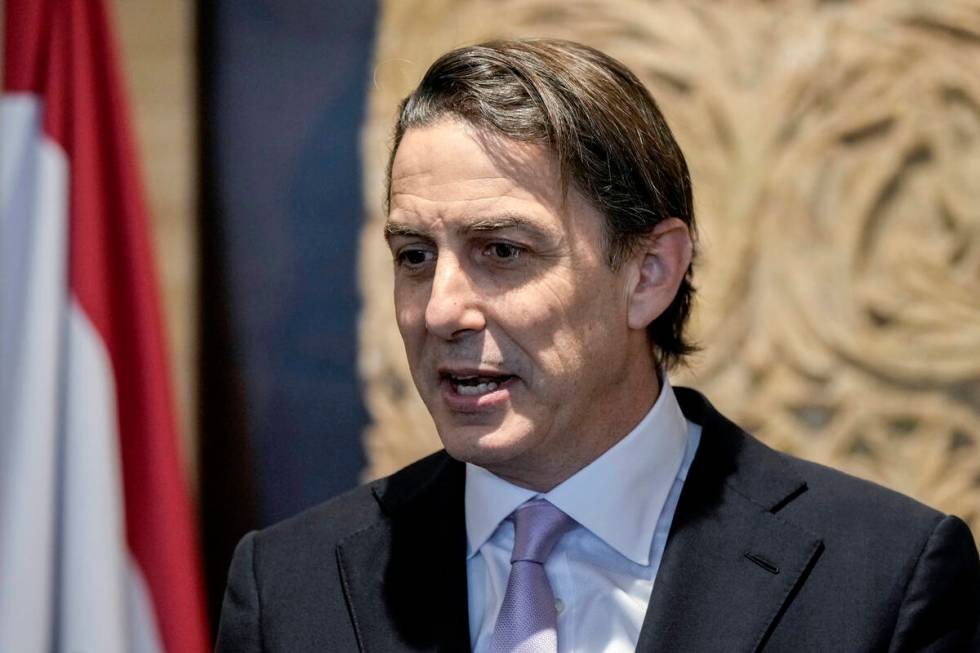Israeli officials demand the right to strike Hezbollah under any cease-fire deal for Lebanon

JERUSALEM — Israeli officials demanded Wednesday the freedom to strike Lebanon’s Hezbollah as part of any cease-fire deal.
Israeli Defense Minister Israel Katz and Foreign Minister Gideon Saar each said Israel sought to reserve the right to respond to any violations by Hezbollah under an emerging proposal, which would push the terrorist group’s fighters and Israeli ground forces out of a U.N. buffer zone in southern Lebanon.
There have been signs of progress on the cease-fire deal and on Wednesday, Hezbollah leader Naim Kassem said the Lebanese terrorist group supports the ongoing negotiations but has “some reservations” and rejects a provision for “freedom of movement” for Israeli troops in Lebanon.
“In any agreement we will reach, we will have to maintain our freedom to act if there will be violations,” Israeli Foreign Minister Saar told diplomats in Jerusalem.
Katz said “the condition for any political settlement in Lebanon” was the right for Israel’s military “to act and protect the citizens of Israel from Hezbollah.”
Amos Hochstein, the Biden administration’s point man on Israel and Lebanon, has been working to push the sides toward agreement and meeting this week with officials in Lebanon. He said Wednesday he would travel to Israel to “try to bring this to a close if we can.”
Hezbollah began firing into Israel on Oct. 8, 2023, in solidarity with Hamas after its terrorist attack on southern Israel that sparked the war in the Gaza Strip. Israel has been responding with strikes in Lebanon, and dramatically escalated its bombardment in late September by launching a ground invasion just inside the border.
In Israel, more than 70 people have been killed by Hezbollah fire, and tens of thousands have fled their homes. Israeli police said a Hezbollah rocket fell outside an empty kindergarten Wednesday in the northern city of Acre, causing damage but no injuries.
In the more than a year of exchanges, more than 3,500 people have been killed in Lebanon, most in the past month, the Health Ministry reported, and over 1 million people have been displaced. It’s unknown how many of the dead were Hezbollah fighters. On Wednesday, 11 more were killed across Lebanon, according to the ministry and Lebanese state media.
Hochstein’s proposal is based on U.N. resolution that ended the 2006 war between Hezbollah and Israel. It stipulates that only the Lebanese army and U.N. peacekeepers should operate in southern Lebanon.
Still, Hezbollah never fully ended its presence in the south. Lebanon accuses Israel of also violating the resolution by maintaining hold of a small, disputed border area and conducting frequent military overflights.
Israel says that Hezbollah has since built up a military infrastructure in villages and towns in southern Lebanon.
The current proposal would include an implementation plan and a monitoring system to ensure each side follows its obligations to fully withdraw from the south. That could involve the United States and France, but details are still unclear.
The war in Gaza is now in its 14th month as Israel battles Hamas in the territory.
Hamas-led terrorists ignited the war in Gaza when its terrorist fighters stormed into Israel on Oct. 7, 2023, killing some 1,200 people, mostly civilians, and abducting around 250. Around 100 hostages are still inside Gaza, at least a third of them believed to be dead.
The death toll has soared to nearly 44,000 dead, according to the Hamas-run Health Ministry in Gaza, which does not distinguish between civilians and combatants in their count.
Hezbollah has said throughout the war in Gaza that it won’t stop firing at Israel until the fighting in the Palestinian territory ends, but that condition was dropped in September after Israel intensified its offensive on the terrorist group, killing its top leadership and degrading its military capabilities.
That leaves Gaza waiting for a cease-fire of its own.
International mediation has stalled repeatedly amid disagreement between Israel and Hamas over whether the war should end as part of a cease-fire deal, with Israel insisting it wants to maintain troop presence in certain areas.
The U.S. on Wednesday vetoed a U.N. resolution calling for a cease-fire in Gaza because it was not linked to an immediate release of hostages taken captive by Hamas
Other tumultuous areas of the Middle East won’t likely be affected by a Hezbollah-Israel cease-fire, including Syria.
Israel frequently targets military sites and facilities associated with Iran-linked groups in Syria but rarely acknowledges the strikes.